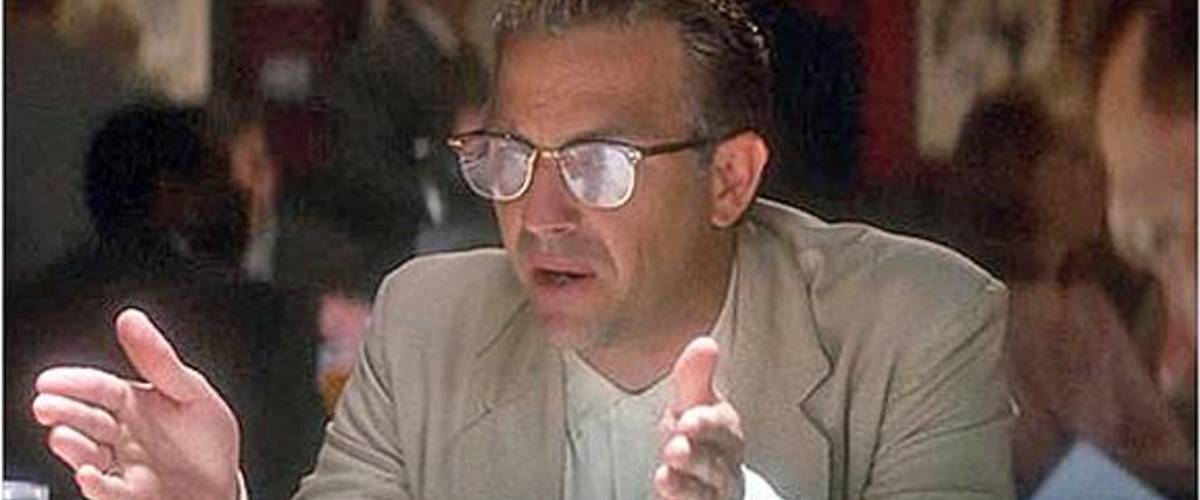
Directed by: Oliver Stone
Starring: Kevin Costner, Tommy Lee Jones, Sissy Spacek, Michael Rooker, Jay O. Sanders, Kevin Bacon, Gary Oldman, Joe Pesci
John F. Kennedy was assassinated on November 22, 1963 in Dallas. Lee Harvey Oswald was arrested and charged with the crime. He was subsequently murdered by Jack Ruby on November 24 as the world watched on television. The Warren Commission Report was later released to the public. The report, based on an investigation into Kennedy's death, concluded Oswald acted alone and there was no evidence of conspiracy. Yet, there has been a nagging sense in the American psyche that this was not true. How could Oswald, who was considered a poor shot during his service in the military, fire off three precise shots in under six seconds using a rifle which needed recycling after each shot? How did he see Kennedy through blooming trees which blocked his view? What about witnesses who swore they saw shots fired from behind a grassy knoll in front of Kennedy's vehicle? And how on Earth can one bullet cause six different wounds between President Kennedy and Texas Governor John Connally? Was the Vietnam War the direct result of Kennedy's death since Kennedy was opposed to the war, which angered the military-industrial complex?
Oliver Stone's JFK chronicles the investigation by New Orleans District Attorney Jim Garrison (Costner) into the Kennedy death. It is based on Garrison's book and covers as well the trial of Clay Shaw (Jones), a New Orleans businessman accused of conspiracy in Kennedy's death. Garrison remains the only person to bring a trial forth in the death of President Kennedy. Is the film a docudrama? No. Oliver Stone's film doesn't claim to have the answers, although he certainly advocates that the official version isn't correct. Stone's goal is to present his argument that, according to Garrison, "the murder of John F. Kennedy on November 22, 1963 was a coup d'etat with Lyndon Johnson waiting in the wings." Stone presents evidence in his attempt to sway public opinion. Whether it is the truth will never be known and it really doesn't matter. JFK is a moving, engrossing film even if not a word of it is true,
JFK isn't based on fact and Stone doesn't present it as such. The real Jim Garrison was a much more controversial figure than depicted here. Costner does a passionate job conveying Garrison's stubborn belief that the truth about Kennedy's death has yet to be revealed. He follows leads, talks to witnesses, and examines documents along with this tireless staff. They know that something isn't right about the Warren report. Garrison is so indefatigable in his quest for the truth that he risks losing all he has, including his life. The investigation begins as a search for a needle in a stack of needles, but soon the focus is on a local businessman named Clay Shaw. Shaw is rich, connected, and homosexual. Testimony from local lowlifes like prostitute Willie O' Keefe (Bacon) places Shaw in the middle of numerous meetings in which the elimination of Kennedy is discussed. Shaw has the connections and resources to help make it happen. Tommy Lee Jones, with silvery gray hair, is very effective as a charming, sophisticated man bemused by the conspiracy allegations. Shaw certainly appears guilty, but can Garrison prove it in court? Is the public ready for the possibility that Kennedy's death was the result of a conspiracy orchestrated by the highest levels of government and executed by the military, Cubans, and maybe even the mafia? Joe Pesci, as David Ferrie, another conspirator, says, "Who killed Kennedy? It's a riddle wrapped in a mystery inside an enigma. The shooters don't even know."
JFK features numerous A-list actors in cameos and supporting roles, all of which contribute key elements without providing distractions like, "Hey, it's Walter Matthau!!" Stone manages to make his mountain of evidence explicable and logical to the viewer. At no point, despite the barrage of images and contradictions which are hurled at us at a dizzying pace, was I ever lost. The music by John Williams adds to the images, which function on the level of a nightmare. The film won Academy Awards for cinematography and film editing and deservedly so. It's amazing how editors Joe Hutshing and Pietro Scalia manage to make sense out of everything.
Stone never loses sight of his narrative. He captures the doubts and fears of Americans that Oswald didn't act alone or if he even acted at all. There sure appear to be a lot of coincidences that can't easily be explained away, such as the conflicting reports of his arrest and the murder of Dallas Police Officer J.D. Tippit, which led somehow to Oswald being charged with Kennedy's assassination. Perhaps the Warren Commission realized that the American people simply couldn't handle the possibility of a vast conspiracy and settled for the "Magic Bullet" theory proposed by the late Arlen Specter. Coups d'état occur in many countries. JFK suggests that one already happened on November 22, 1963 and nobody noticed. What a terrifying thought.
No comments:
Post a Comment